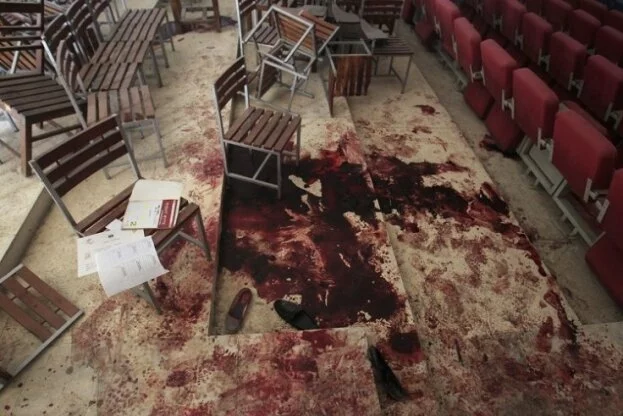Pakistan executes two terrorists after lifting moratorium on death penalty
- Published in World
- Comments::DISQUS_COMMENTS

Islamabad: Two terrorists were hanged on Friday in Pakistan in the first executions since 2008, officials said, after the government ended a moratorium on the death penalty earlier this week.
The government ended the six-year ban on capital punishment for terror-related cases following a brutal terror attack on a school in Peshawar on Tuesday that killed 149 people, mostly children.
"Yes, two militants Aqil alias Doctor Usman and Arshad Mehmood have been hanged in Faisalabad jail," Shuja Khanzada, Home Minister of central Punjab province, where the executions took place, said.
A senior official from the prison department also confirmed the executions. Aqil, who uses the name Doctor Usman, was convicted for an attack on the army headquarters in Rawalpindi in 2009 and was arrested after being injured.
Arshad Mehmood was convicted for his involvement in a 2003 assassination attempt on former president General Pervez Musharraf. On Thursday, Pakistan's military chief signed death warrants for six terrorists on death row after the government ended the death penalty moratorium on Wednesday.
Just hours later, the government warned prison officials of a possible jailbreak in the restive northwest province of Khyber-Pakhtunkhwa amid fears that terrorist groups could try to spring high-ranking comrades from jails to avoid the noose.
Pakistan's decision to relinquish a ban on the death penalty in terror-related cases came as the country's political and military leaders have vowed to wipe out the homegrown Islamist insurgency following Tuesday's attack on the army school.
The United Nations called for Pakistan to reconsider executing terror suspects, saying that "the death penalty has no measurable deterrent effect on levels of insurgent and terrorist violence" and "may even be counter-productive". "We urge the Government not to succumb to wide-spread calls for revenge," said UN Human Rights Office spokesperson Rupert Colville.
Pakistan imposed a de facto moratorium on civilian executions in 2008, though hanging remains on the statute book and judges continue to pass the death sentence. Only one person has been executed since then, a soldier convicted by a court martial and hanged in November 2012.
Rights campaign group Amnesty International estimates that Pakistan has more than 8,000 prisoners on death row, most of whom have exhausted the appeals process. The government says that more than 500 convicts are related to terror cases.
The government ended the six-year ban on capital punishment for terror-related cases following a brutal terror attack on a school in Peshawar on Tuesday that killed 149 people, mostly children.
"Yes, two militants Aqil alias Doctor Usman and Arshad Mehmood have been hanged in Faisalabad jail," Shuja Khanzada, Home Minister of central Punjab province, where the executions took place, said.
A senior official from the prison department also confirmed the executions. Aqil, who uses the name Doctor Usman, was convicted for an attack on the army headquarters in Rawalpindi in 2009 and was arrested after being injured.
Arshad Mehmood was convicted for his involvement in a 2003 assassination attempt on former president General Pervez Musharraf. On Thursday, Pakistan's military chief signed death warrants for six terrorists on death row after the government ended the death penalty moratorium on Wednesday.
Just hours later, the government warned prison officials of a possible jailbreak in the restive northwest province of Khyber-Pakhtunkhwa amid fears that terrorist groups could try to spring high-ranking comrades from jails to avoid the noose.
Pakistan's decision to relinquish a ban on the death penalty in terror-related cases came as the country's political and military leaders have vowed to wipe out the homegrown Islamist insurgency following Tuesday's attack on the army school.
The United Nations called for Pakistan to reconsider executing terror suspects, saying that "the death penalty has no measurable deterrent effect on levels of insurgent and terrorist violence" and "may even be counter-productive". "We urge the Government not to succumb to wide-spread calls for revenge," said UN Human Rights Office spokesperson Rupert Colville.
Pakistan imposed a de facto moratorium on civilian executions in 2008, though hanging remains on the statute book and judges continue to pass the death sentence. Only one person has been executed since then, a soldier convicted by a court martial and hanged in November 2012.
Rights campaign group Amnesty International estimates that Pakistan has more than 8,000 prisoners on death row, most of whom have exhausted the appeals process. The government says that more than 500 convicts are related to terror cases.
Tagged under
- Islamabad
- Pakistan
- Terrorists
Related items
-
 Waqar fears 'death' of Pakistan cricket
Waqar fears 'death' of Pakistan cricket
-
 Quarter final defeat: Pakistan fans break TV sets after team’s exit from Cricket World Cup
Quarter final defeat: Pakistan fans break TV sets after team’s exit from Cricket World Cup
-
 World Cup 2015: Australia stuns Pakistan, to face India in Semifinal
World Cup 2015: Australia stuns Pakistan, to face India in Semifinal
-
 Pilgrim critically injured as terrorists attack Army camp in Samba
Pilgrim critically injured as terrorists attack Army camp in Samba
